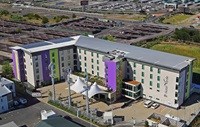
Hotel Verde spent three years researching, conceptualising and building the hotel, which showcases some of the most advanced environmentally-conscious technological installations, construction methods, and procurement and operational practices in the world. The publicity and positive reputation generated for the brand have been overwhelming - the media, public and their guests have embraced Hotel Verde's greening efforts.
With the launch of Verde Invest, they are looking for opportunities to increase their carbon-friendly footprint in the international arena by facilitating and overseeing the building of green hotels, applying sustainable building and operation practices and continuing their work as pioneers of green hotels around the continent. Delicio strongly believes that going green is the only way for companies to operate on a responsible basis. "We owe it not only to our environment, but also to future generations who will inherit this planet from us," he says.
Verde Invest will be targeting countries within Africa first, where the biggest growth potential and need for new hotels and responsible building worldwide lies. The potential of this area is supported by statistics from UNWTO World Tourism Barometer, which forecasts international arrivals to increase by 4% to 4.5% in 2014 with regional prospects strongest for Asia and the Pacific (+5% to +6%) and Africa (+4% to +6%).
The traditional building process and time spent, compared with building green, is very similar; rather it is the different materials used and the approach and design principles which take the sustainable aspect and environmental impact into consideration. Ideally, as much of the materials as possible will be procured within a 600km radius as stipulated by LEED, however, there are, for example, certain essential equipment which is not produced locally, but is imperative to the process, that we have to secure abroad, in order to operate more efficiently. "So," says Delicio, "at times, it is worth importing and creating a bigger carbon footprint in the first place, if further down the line we achieve much bigger savings."
The initial financial implications of building green in Africa are at a premium of between 1 and 10% of building costs (international premiums vary between 0% and 6%), but return on investment is achieved through significant reduction in operational costs. Hotel Verde's benchmark operational savings are 32%, largely as a result of lower running costs such as water, electricity, maintenance, refuse removal, etc. They are running at 70% higher energy efficiency than an average Cape Town hotel and according to a report published by the Green Hotels Association, companies with proactive environmental strategies have a 4% higher return on investment, 9% higher sales growth and 17% higher operating growth than companies with poor environmental track records.
Our common goal across all cultures should ultimately be that of not just building green, sustainable structures but also building sustainable cities, communities and a sustainable world. "It is the strong desire of the Verde Invest team and myself," says Delicio, "that Hotel Verde will be a benchmark for others to build from and that it will lead the way for other new or existing hotels to be constructed and operated in a more sustainable way, and make good on their investments and into the future of this planet."